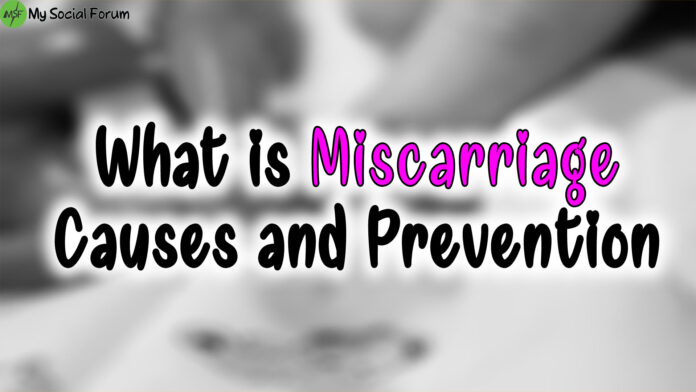What is Miscarriage? Causes & Prevention
Once you have suffered a miscarriage, it does not mean that you have fertility problems. Or you may not be able to get pregnant again. 87% of the women who have miscarriages later have normal pregnancies and can give birth.
What is a spontaneous abortion?
A spontaneous abortion is most commonly known as a miscarriage, is the abruptly ending of a pregnancy. About 1/2 to 1/3 of all pregnancies end up in miscarriages early on before the expected mother misses her menstrual period or even realizes that she expects a baby.
A miscarriage mostly occurs before 20 weeks’ gestation or within the first three months of pregnancy where as late miscarriages are only 1% of the miscarriages that happen after 20 weeks’ period.
Some risk factors for a miscarriage:
These factors are traits or behaviors that contribute to a person’s chances of having a miscarriage. Some of these risk factors may include:
- Underlying health conditions of the mother
- The age of the expected mother. Researches indicate that the risk factors of miscarriage are 12% to 15% for women in their 20s, and it rises to almost about 25% for women at the age of 40. The increase in the frequency of chromosomal abnormalities plays a significant role in the age-related miscarriage risks.
What causes miscarriage?
Hereditary or spontaneous chromosomal abnormalities in either the mother’s eggs or the father’s sperm contribute to almost half of all the miscarriages during the first trimester. These chromosomes are tiny formations inside the body’s cells carrying many genes that are the essential heredity components.
Genes are responsible for determining all of a person’s physical attributes, such as hair and eye color, sex, and his blood type. Most of the chromosomal problems are by chance and can not be attributed to the mother’s or father’s health conditions.
How to Prepare Your Body for Pregnancy
Miscarriages may be caused by a variety of known and unknown reasons such as:
- The Incompetent cervix. When the cervix begins to widen and open earlier than needed, mostly in the middle stage of pregnancy, without showing any signs of labor or pain.)
- Factors like drinking alcohol, smoking, or the use of illegal drugs.
- Environmental or workplace Hazardous and toxic Exposures
- Hormonal imbalances
- Radiation.
- Disorders of the immune system such as lupus, an autoimmune disease.
- Severe kidney disease.
- Infection.
- Severe malnutrition.
- Improper implantation of fertilized egg in the uterine lining.
- Maternal age.
- Uterine abnormalities.
- Congenital heart disease.
- Uncontrolled Diabetes.
There are no existing evidences to prove that stress or physical or sexual activity can lead to miscarriage.
Occasionally it is seen that the treatment of a mother’s illness may increase the chances for a successful pregnancy.
What are the symptoms of a miscarriage?
Some of the symptoms of a miscarriage include:
- Progressive bleeding from light to heavy.
- Cramps.
- Pain in the abdomen.
- Mild to severe low back.
If you face any of the symptoms mentioned above, you should contact your Doctor at the earliest for a detailed medical evaluation and assistance.
Top Ways To Get Pregnant Fast & Easy
What happens after a miscarriage?
Mild discomfort and spotting are the most common symptoms encountered post-miscarriage. If you notice heavy bleeding, chills, pain, or fever, contact you’re the nearest Doctor for medical attention for an infection.
How to diagnose and Treat a miscarriage?
Your physician may conduct an ultrasound along with a pelvic exam to substantiate the miscarriage. In case the uterus is clear, and the miscarriage is complete, then no further treatment may be needed. Some times it so happens that the uterus is not yet fully emptied, so dilation and extraction (D&E) or a dilation and curettage (D&C) is required.
In these procedures, the cervix is usually dilated. Simultaneously, the remaining fetal or placental tissue is gently scraped or suctioned out of the uterus, so the menstrual period resumes within 4 to 6 weeks of a miscarriage.
If symptoms of a miscarriage persist without a confirmation of the condition then complete bed rest is often prescribed with hospitalization overnight for further evaluation. As the bleeding halts, you may continue pursuing your normal activities. In case the cervix is dilated, a diagnosis of an incompetent cervix may be made initiating the respective procedure to close the cervix (called cerclage).
Your evaluations such as your genetic tests, blood tests, or provision of medicine may be necessary if you have been through two miscarriages in a row. There are Some diagnostic procedures that evaluate the causes of repeated miscarriages. They include:
- Laparoscopy. (It is a procedure for examining the pelvic organs with a lighted instrument)
- Endometrial biopsy.
- Hysterosalpingogram (It is the uterus and fallopian tube X-ray)
- Hysteroscopy (An examination during which the Doctor assesses the inside of the uterus with a thin, telescope-like device)
After a miscarriage can I get pregnant once again?
Keep in mind that a miscarriage cannot be prevented and often occurs because it is not normal. Also there is no sure waiting period to attempt pregnancy, it may be appropriate to discuss the timing of your next pregnancy with your private Doctor.
Preventing Miscarriage:
To prevent second or third miscarriage, your private Doctor may recommend treatment with progesterone i.e. a hormone needed for implantation in the uterus. If the mother has an illness, treating the condition can improve the chances of a successful pregnancy.
Taking the time to heal emotionally and physically after suffering a miscarriage is essential for your health.
You are not to Blame:
Above all, don’t blame yourself for the miscarriage. Counseling also helps you with coping with your loss.
Consecutive Miscarriages:
If you have suffered three miscarriages in a row then you should stop trying to conceive, your doctor may advice you to use some form of birth control, and conduct a diagnostic evaluation to determine the reason of the miscarriage.



































